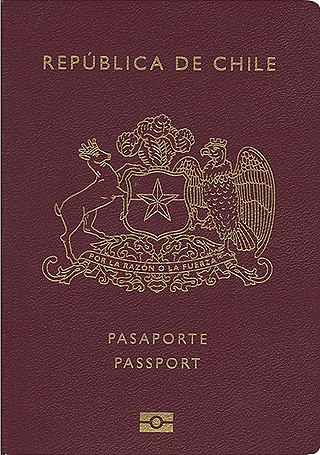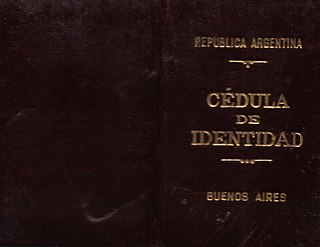An identity document is any document that may be used to prove a person's identity. If issued in a small, standard credit card size form, it is usually called an identity card, or passport card. Some countries issue formal identity documents, as national identification cards that may be compulsory or non-compulsory, while others may require identity verification using regional identification or informal documents. When the identity document incorporates a person's photograph, it may be called photo ID.

The Identity Cards Act 2006 was an Act of the Parliament of the United Kingdom that was repealed in 2011. It created National Identity Cards, a personal identification document and European Economic Area travel document, which were voluntarily issued to British citizens. It also created a resident registry database known as the National Identity Register (NIR), which has since been destroyed. In all around 15,000 National Identity Cards were issued until the act was repealed in 2011. The Identity Card for Foreign nationals was continued in the form of Biometric Residence Permits after 2011 under the provisions of the UK Borders Act 2007 and the Borders, Citizenship and Immigration Act 2009.
A national identification number, national identity number, or national insurance number or JMBG/EMBG is used by the governments of many countries as a means of tracking their citizens, permanent residents, and temporary residents for the purposes of work, taxation, government benefits, health care, and other governmentally-related functions.

Lesbian, gay, bisexual, and transgender (LGBT) rights in Costa Rica have evolved significantly in the past decades. Same-sex sexual relations have been legal since 1971. In January 2018, the Inter-American Court of Human Rights made mandatory the approbation of same-sex marriage, adoption for same-sex couples and the removal of people's sex from all Costa Rican ID cards issued since October 2018. The Costa Rican Government announced that it would apply the rulings in the following months. In August 2018, the Costa Rican Supreme Court ruled against the country's same-sex marriage ban, and gave the Legislative Assembly 18 months to reform the law accordingly, otherwise the ban would be abolished automatically. Same-sex marriage became legal on 26 May 2020.

The cédula de identidade is the official national identity document in Brazil. It is often informally called carteira de identidade, "RG" or simply identidade in Portuguese. The card contains the name of the bearer, filiation, place of birth, date of birth, signature and thumbprint of the bearer. Other national documents can legally be used as an identity card, such as a federative unit-issued driver's license, passport or, for minors, a birth certificate. Each card has a unique RG number. As of 11 January 2023, the CPF number will be used as the RG number on new identity cards.

The Mexican passport is the passport issued to Mexican citizens for the purpose of travelling abroad. The Mexican passport is also an official ID and proof of Mexican citizenship. According to the January 2024 Henley Visa Restrictions Index, holders of a Mexican passport can visit 161 countries without a visa, placing Mexico in the 23rd rank in terms of global travel freedom.

The Colombian passport is a travel document which is issued to citizens of Colombia for the purpose of international travel. Since September 2015, a biometric passport has been issued, but the previously issued machine-readable passport can be used until its expiration date.

Paraguayan passports are issued to Paraguayan citizens for travel outside of Paraguay. For traveling to full and associated member states of Mercosur, Paraguayan citizens can also use their civil identity cards.

A Chilean passport is an identity document issued to citizens of Chile to facilitate international travel. Chilean passports are valid for worldwide travel and facilitate the access to consular services whilst abroad. They are issued by the Registro Civil e Identificación.

A cédula de identidad (Spanish), also known as cédula de ciudadanía or Documento de identidad (DNI), is a national identity document in many countries in Central and South America. In certain countries, such as Costa Rica, a cédula de identidad is the only valid identity document for many purposes; for example, a driving license or passport is not valid to open a bank account. The term "cédula" may also colloquially refer to the number on the identity document.
A resident register is a government database which contains information on the current residence of persons. In countries where registration of residence is compulsory, the current place of residence must be reported to the registration office or the police within a few days after establishing a new residence. In some countries, residence information may be obtained indirectly from voter registers or registers of driver licenses. Besides a formal resident registers or population registers, residence information needs to be disclosed in many situations, such as voter registration, passport application, and updated in relation to drivers licenses, motor vehicle registration, and many other purposes. The permanent place of residence is a common criterion for taxation including the assessment of a person's income tax.
Consular identification (CID) cards are issued by some governments to their citizens who are living in foreign countries. They may be used, for example, by an embassy to allow its citizens to vote in a foreign country. Some jurisdictions accept them for some identification purposes. They are not certifications of legal residence within foreign countries, so CID card holders could be legal or illegal aliens.

The Iranian identity card is the primary identity document in Iran. Every citizen age of 15 and above, whether resident or not, needs to apply for such a card, which bears their unique national identity number, given name, surname, birth date, and postal code. The current version of this card is called the national smart card and is the successor of the national card. This card is intended to reduce the need for the more valuable Iranian identity booklet, which is issued at birth.

A voter identification law is a law that requires a person to show some form of identification in order to vote. In some jurisdictions requiring photo IDs, voters who do not have photo ID often must have their identity verified by someone else or sign a Challenged Voter Affidavit in order to receive a ballot to vote.

The Dominican national identity card is a polycarbonate card containing the holder's full name, place of birth, date of birth, nationality, sex, civil status, occupation, polling station, and residential address, as well as a photograph that adheres to ISO/IEC 19794-5. The card can also optionally include the holder's blood type. Formerly, it included the holder's race.

Lucila Rubio de Laverde (1908-1970) was a Colombian socialist and one of the leading suffragettes in her country. She was also a teacher and the first woman to present a demand for the vote to the President of Colombia.

Multiple countries legally recognize non-binary or third gender classifications. These classifications are typically based on a person's gender identity. In some countries, such classifications may only be available to intersex people, born with sex characteristics that "do not fit the typical definitions for male or female bodies."

The Documento Nacional de Identidad (DNI) (Spanish for 'National Identity Document') is the only personal identity card recognized by the Peruvian Government for all civil, commercial, administrative, judicial acts and, in general, for all those cases in which, by legal mandate, it must be presented. It is a public document, personal, and non-transferable and also constitutes the only title of right to the suffrage of the person in whose favor it has been granted. Its issuance is in charge of the National Registry of Identification and Civil Status (RENIEC).
The Colombian Identity Card is the identity document issued to Colombian citizens by local registry offices in Colombia and diplomatic missions abroad to every Colombian person over 18 years of age, while for minors it is the "Tarjeta de Identidad”. This is the only valid identification document for all civil, political, administrative and judicial acts according to Colombian Law 39 of 1961. They are produced and issued by the National Civil Registry.













